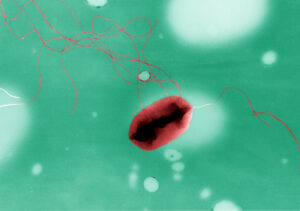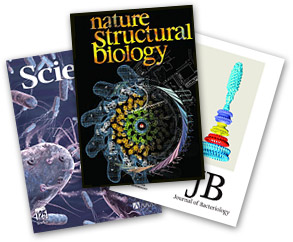Intelligent Design has been defined by its proponents as the idea that “certain features of the universe and of living things are best explained by an intelligent cause.” This “intelligent cause” is often assumed to be God. Despite this, some have tried to portray Intelligent Design as a fledgling scientific theory, almost ready to be embraced by mainstream science. Detractors have argued that Intelligent Design is nothing more than creationism in disguise.1
So which is it? Use the Science Checklist to see how Intelligent Design differs from science:

![]() Focuses on the natural world?
Focuses on the natural world?
Intelligent Design is promoted as an explanation for the diversity of life and for the anatomical and molecular features of many organisms (e.g., bacterial flagella, pictured at right).
![]() Aims to explain the natural world?
Aims to explain the natural world?
Intelligent Design does claim to explain the natural world — but falls dramatically short in the explanations it offers. For example, Intelligent Design explains the existence of one type of bacterial flagellum with the action of an Intelligent Designer, but fails to offer any information on how the designer might have constructed the flagellum or on who that designer might be.
![]() Uses testable ideas?
Uses testable ideas?
Scientific ideas generate specific expectations about observations of the natural world that would support or refute the idea. However, because Intelligent Design doesn’t specify what the Designer is or how the Designer operates, it cannot generate expectations specific enough to help us figure out whether the basic premises of Intelligent Design are correct or incorrect. Intelligent Design is untestable.
![]() Relies on evidence?
Relies on evidence?
Because the central mechanism of Intelligent Design is untestable, evidence relevant to the idea is lacking. However, some ID proponents have made testable claims that deal more with discrediting evolution than with the mechanism of Intelligent Design. These claims (e.g., that the components of bacterial flagella cannot function independently of one another) have been tested and refuted by the evidence.
![]() Involves the scientific community?
Involves the scientific community?
Intelligent Design proponents have rarely published on Intelligent Design in established scientific journals and resist modifying their ideas in response to the scrutiny of the scientific community. These advocates have organized themselves into a community — but one devoted to promoting their idea, not one organized around the activities of science and figuring out how the natural world really works.

![]() Leads to ongoing research?
Leads to ongoing research?
So far, there are no documented cases of Intelligent Design research contributing to a new scientific discovery. Intelligent Design proponents, of course, continue to write about the idea, but this work is not generative — that is, it tends to repeat itself and does not help build new, more detailed explanations. Intelligent Design proponents instead tend to focus on critiquing specific evolutionary explanations (e.g., for bacterial flagella). Ironically, the misapplication of evolutionary theory and misunderstanding of the nature of science inherent in these critiques has so frustrated evolutionary biologists that they have sometimes increased their research efforts in the areas targeted by Intelligent Design. We now know a lot more about how bacterial flagella evolved than we did ten years ago!
![]() Researchers behave scientifically?
Researchers behave scientifically?
Though there is diversity within the group, Intelligent Design proponents generally fail to meet the norms for good scientific behavior in their work on Intelligent Design on several counts. First, few advocates build on existing scientific knowledge. Many misinterpret evolutionary theory and the nature of science, and do not fully understand the current research in an area before launching a critique of it. Perhaps most importantly, because Intelligent Design is untestable, proponents are unable to expose their ideas to testing in a meaningful way and cannot evaluate whether their ideas are supported by evidence.
Now it’s up to you. How does Intelligent Design differ from science?
To see our answer, click here.
Intelligent Design is very different from science. Though the idea deals with phenomena in the natural world, research in this area does not bear any of the other hallmarks of science. Most importantly, though proponents sometimes make testable — and refuted — claims that relate to evolutionary theory, Intelligent Design itself is not testable and so cannot be validated by the central method of science — testing ideas against evidence from the natural world.
1National Center for Science Education. What is "Intelligent Design" Creationism? Retrieved October 30, 2008 from http://ncseweb.org/creationism/general/what-is-intelligent-design-creationism.
